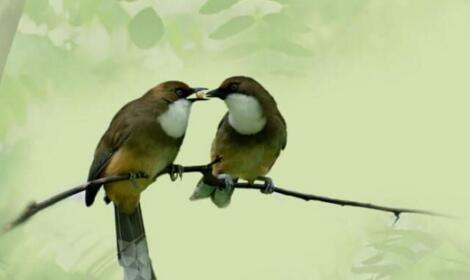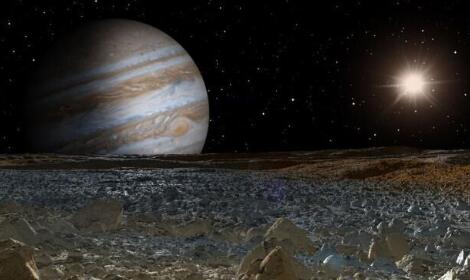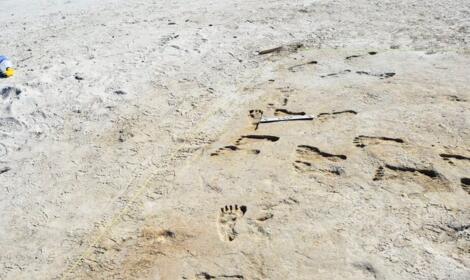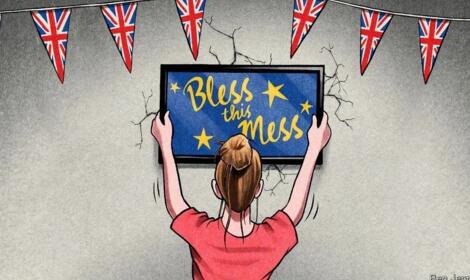章鱼的心灵:神秘的内心世界远超出你的想象
正文翻译

It was a big night for Inky the octopus. The day's visitors had been and gone, and now his room in the aquarium was deserted. In a rare oversight, the lid of his tank had been left ajar. The common New Zealand octopus had been without female company for some time, sharing a tank with only a fellow male, Blotchy. The loose lid provided Inky with an opportunity. With eight strong suckered limbs and, quite possibly, intimate concerns on his mind, Inky hauled himself out of the water, made his way under the loose lid, and off across the aquarium floor.
对于章鱼“墨墨”来说,这是个重大的夜晚。当天的游客都走了,现在他的水族馆房间里空无一人。一次罕见的疏忽使他的水族箱没被盖严。这只新西兰的普通章鱼已经好些日子没有异性伴侣了,水族箱里只有雄性同伴“斑斑”。松动箱盖给了“墨墨”可乘之机。很可能出于心事,“墨墨”利用八条强壮的吸盘式触手将自己拖出水面,在松动的箱盖下移动,逃出水族箱,在水族馆的地板上爬行。
He made it about 13ft (4m) when he found something else – not a mate, but a drain that emptied into the Pacific Ocean. With that, Inky was gone.
当他爬行了大约13英尺(4米)时发现了别的东西——不是伴侣,而是通往太平洋的地漏,于是“墨墨”从这里逃跑了。
(No one, besides Blotchy, was there to witness this great escape. But with the help of a wet trail and a few telling sucker marks, Inky's movements were later pieced together by the staff of the New Zealand National Aquarium in the city of Napier.)
(除了“斑斑”之外,没人看到这次大逃脱。但后来借助水迹和多处明显的吸盘痕迹,位于纳皮尔市的新西兰国家水族馆的员工逐渐弄清了“墨墨”的行动轨迹)。
As Inky demonstrated in his famous escapade, octopuses are enterprising animals adept at problem solving. They are acutely intelligent and able to learn novel tasks and orient themselves within their environment. There is also growing consensus that octopuses are most likely sentient.
正如“墨墨”在他著名的大冒险中所展现的,章鱼是一种善于解决问题的进取型动物。它们极其聪明,能够学习新型活动和适应环境。另外,章鱼很可能拥有知觉,这一点越来越得到共识。
People who work with octopuses or who spend a lot of time in their company describe the sense that when you look at an octopus, there is something looking back.
据那些与章鱼一起工作或长期相处的人描述,当你目视一只章鱼时,感觉有东西在回头看你。
"When you're dealing with an octopus who's being attentively curious about something, it is very hard to imagine that there's nothing experienced by it," says Peter Godfrey-Smith, professor of history and philosophy of science at the University of Sydney in Australia, and author of Other Minds: The Octopus and the Evolution of Intelligent Life. "It seems kind of irresistible. That itself is not evidence, that's just an impression."
“当与你相处的章鱼对某种东西表现出专注的好奇心时,你很难想象它没有任何感受”,澳大利亚悉尼大学科学史与科学哲学教授、《他心:章鱼与智慧生命的进化》一书的作者彼得·戈德弗雷-斯密斯说道。“这似乎无法抗拒,其本身不是证据,仅仅是一种直觉”。
Given this hunch as a starting point, how do you begin to explore the consciousness of an animal so unlike ourselves?
从这种直觉出发,你会如何探索与我们截然不同的动物知觉?

The octopus has a body plan and nervous system very unlike our own – yet we share the capacity to experience pain, and possibly other feelings
章鱼的形体构型和神经系统与我们截然不同,但人和章鱼都能感觉到疼痛,可能呢还有其他知觉。
To start with, what do philosophers and scientists mean by "consciousness" in this context? Godfrey-Smith takes it as meaning there is "something it is like to be that animal". In a famous essay, the philosopher Thomas Nagel asks "What is it like to be a bat?" Nagel described the problem that imagining the inner experience of a bat is very difficult, if not impossible, when your reference point is the human body and your own human mind.
首先,哲学家和科学家在这里所谓的“知觉”是指什么?戈德弗雷-斯密斯认为是“做那种动物的感觉”。在一篇著名的论文中,哲学家托马斯·内格尔问道:“做一只蝙蝠是什么感觉”?内格尔道出了其中的困难:由于你的参照点是人体和你自己的人类思维,所以想象蝙蝠的内心世界是非常困难的,甚至不可能做到。
Likewise, imagining an octopus's inner life is a hard thing to do from our human standpoint. Try it for a moment – imagine what it's like to be suspended in the cool blueish twilight down at the seabed, perhaps a slight drag of current pulling you this way and that, your eight arms waving gently around you. When you picture the tips of your suckered limbs moving, what do you imagine it feels like? Is it, perhaps, something like wiggling your human fingers and toes?
同样,从我们人类的角度想象章鱼的内心世界也是困难的事情。想象一下,当你悬浮在海底冷蓝色的柔光中是什么感觉,也许水流的轻微阻力使你飘来荡去,你的八条触手在身边轻柔地摆动。当你想象自己长着吸盘的触手末端移动时,你能想象那是什么感觉吗?可能就像人类摆动手指和脚趾的感觉?
Now add into the equation that an octopus is an invertebrate, with no skeleton at all. Its legs have no femur, tibia or fibula, no feet and no toes to wiggle. Instead, octopuses have a hydrostatic skeleton, combining muscular contraction and water's resistance to compression to generate movement. This is very different from your own experience of moving your extremities – a little closer might be when we move our tongues, which also make use of hydrostatic pressure. Indeed, the octopus's limbs are covered in suckers that have unique sensors that taste everything they touch.
另外,章鱼是没有骨骼的无脊椎动物。它的触手没有股骨、胫骨、腓骨,也没有可以摆动的脚和脚趾。但章鱼有流体静力骨骼,利用肌肉收缩和水体抗压性来产生运动。这与我们移动四肢的感觉既然不同,可能有点类似于我们舌头的活动,依靠的也是流体静压力。事实上,章鱼的触手上布满了吸盘,吸盘上独有的传感器能够品尝它们触碰到的任何物体。
"The octopus's arms are, in some ways, more like lips or tongues than hands," says Godfrey-Smith. "There's a whole great cascade of sensory information of that taste-based form that's coming in every time the animal does anything. That's very different from our situation."
“在某些方面,章鱼的触手更像是嘴唇或舌头而不是手”,戈德弗雷-斯密斯说道。“无论章鱼做什么,每次都能搜集大量基于味觉的感官信息,这与我们人类有很大区别”。
Take a closer look at the octopus's nervous system, and things get even stranger. The octopus's arms have more autonomy than our human arms and legs do. Each has its own miniature brain, giving it a degree of independence from the animal's central brain. Our own nervous system, however, is highly centralised, with the brain the seat of sensory integration, emotion, initiating movement, behaviour and other actions.
如果仔细研究章鱼的神经系统,情况变得更加怪异。章鱼的触手比我们人类的四肢更具有自主性,每条触手都有自己的微型大脑,在一定程度上独立于中央大脑。然而,我们人类的神经系统高度集中,大脑负责掌管感官统合、情绪、运动、行为及其他行为。
"One of the real challenges we have is to try to work out what experience might be like in a less centralised, less integrated kind of system," says Godfrey-Smith. "In the case of the octopus, people sometimes ask whether there might be multiple selves present. I think it's just one self per octopus, but there might be a kind of partial fragmentation, or just a sort of looseness there."
“我们面临的一个真正挑战是,如果神经系统缺少集中性和整合性,可能是什么感觉”,戈德弗雷-斯密斯说道。“有时人们会疑惑章鱼是否可能有多个自我。我认为每只章鱼只有一个自我,但可能存在一定程度的自我分裂或模糊”。
The closer you look at the octopus's body and nervous system, the harder it becomes to grasp – or believe you are grasping – what it might be like to be an octopus. After all, the last common ancestor we shared with octopuses lived 600 million years ago (an uninspiring-looking animal something like a flatworm).
你越是仔细研究章鱼的躯体和神经系统,越是难以理解——或难以相信自己体会到做一只章鱼的感受。毕竟我们与章鱼的最后一个共同祖先生活在6亿年前(一种不吸引眼球、类似扁形虫的动物)。
However hard it might be to do, it's worth trying to understand whether octopuses have consciousness, and what it's like if they do, says Godfrey-Smith. "We've just got to think about it, work through it and try to put together a picture."
无论多么困难,都值得我们设法了解章鱼是否有知觉,如果有的话,又是怎样的知觉,戈德弗雷-斯密斯说道。“我们必须思考、攻克,搞清楚状况”。
It's a question that is becoming more urgent. The multinational seafood firm Nueva Pescanova is currently seeking licenses to open the world's first commercial octopus farm in the Canary Islands. The announcement has raised obxtions from animal welfare activists that it is not ethical to farm such intelligent and possibly sentient animals. As one essay puts it: "When the question of animal consciousness is under consideration, our guilt or innocence as a civilization for an enormous body of cruelty may hang in the balance."
这个问题变得越来越紧迫。跨国海鲜公司Nueva Pescanova正在谋求许可证,打算在加那利群岛开办世界首个商业化章鱼养殖场。公司的生命遭到动物福利活动人士的反对,理由是养殖这么聪明、而且可能有知觉的动物是不道德的。正如一篇文章所言:“由于动物知觉问题尚处在研究阶段,我们作为一个虐待成性的文明是否有罪,可能有待于商榷”。
Nueva Pescanova told BBC Future that the firm is carrying out research into the "cognitive and neurophysiological mechanisms of the octopus", and that its aquaculture conditions allow the firm "to obxtively improve the octopus welfare". Nueva Pescanova says its aquaculture conditions will mimic the natural habitat of the octopus in the wild. "It is a novel system that is giving excellent results in terms of growth, survival and endowment of the specimens," a spokesperson for the firm says.
Nueva Pescanova公司向BBC未来栏目透露,公司正在研究“章鱼的认知和神经生理学机制”,其养殖环境能让公司“客观地改善章鱼的福利”。Nueva Pescanova公司表示,其养殖环境将模仿章鱼的野外生存环境。“这种新的养殖方法在章鱼的生长、生存、天性方面成效卓著”,公司发言人说道。

Octopuses are talented escape artists, known to unscrew jars from the inside and open the lids of their containers
章鱼是天生的逃脱大师,众所周知能够从内部拧开罐子,以及打开容器的盖子。
As Heather Browning, a postdoctoral researcher in animal sentience and welfare at the London School of Economics, argues in an essay: "The mind of an octopus may be highly different from our own, but it is only by trying to see the world from their point of view that we will be able to find out what is good for them and hence ensure their welfare."
在伦敦经济学院从事动物知觉与福利研究的博士后希瑟·勃朗宁在论文中指出:“章鱼的思维可能与我们的截然不同,但只有站在它们的角度去看待世界,才会知道什么对它们有益,从而保障它们的福利”。
Browning, who is working on a project on the Foundations of Animal Sentience at LSE, was part of a team that sought to answer the question of whether octopuses are conscious in an influential report.
勃朗宁在伦敦政治经济学院开展有关动物知觉基础的科研项目,他参与过的一个团队试图在一篇有影响力的报告书中回答章鱼是否存在知觉的问题。
One approach is to start out with a case study for something we know is sentient: other human beings. "If we really get down to it, we assume that we are sentient ourselves, and we assume that other humans are like us as well, which I think is really reasonable," says Browning. "From there, you can start looking at features that other animals might have in common with us."
一种方法是从我们已知的有知觉的对象入手进行个案研究:其他人类。“如果我们认真研究这个问题,我们认为自己是有知觉的,我们认为其他人类也和我们一样,我认为这非常合理”,布朗宁说道。“由此开始观察其他动物可能与我们共有的特征”。
Take, for instance, the ability to feel pain – the focus of the LSE team's report on cephalopod molluscs (which include octopuses, cuttlefish and squid) and decapod crustaceans (which include crabs, crayfish, lobsters, prawns and shrimps). Browning and her colleagues reviewed more than 300 scientific papers to distil eight criteria that suggest an animal can feel pain:
例如,痛觉是伦敦政治经济学院团队报告的焦点,研究对象是头足类软体动物(包括章鱼、乌贼、鱿鱼)和十足目甲壳类动物(包括螃蟹、小龙虾、龙虾、对虾、小虾)。布朗宁和她的同事查阅了300多篇科学论文,总结出动物拥有痛觉的八大标准:
possession of nociceptors (receptors that detect noxious stimuli – such as temperatures hot enough to burn, or a cut)
拥有痛觉感受器(感知伤害性刺激的受体,例如足以灼伤的高温或伤口)。
possession of parts of the brain that integrate sensory information
拥有整合感官信息的大脑区域。
connections between nociceptors and those integrative brain regions
伤害感受器与大脑的整合区域之间具有连通性。
responses affected by local anaesthetics or analgesics
疼痛反应会受到局部麻醉或镇痛的影响。
motivational trade-offs that show a balancing of threat against opportunity for reward
在威胁与奖励机会之间做出动机性权衡。
flexible self-protective behaviours in response to injury and threat
运用灵活的自我保护行为应对伤害和威胁。
associative learning that goes beyond habituation and sensitization
超越习惯化和敏化的联想式学习。
behaviour that shows the animal values local anaesthetics or analgesics when injured
当动物受伤时,表现出喜欢局部麻醉或镇痛的行为。
An animal can meet a criterion with a high, medium or low level of confidence, depending on how conclusive or inconclusive the research is. If an animal meets seven or more of the criteria, Browning and her colleagues argue there is "very strong" evidence that the animal is sentient. If it meets five or more with a high level of confidence, there is "strong evidence" of sentience, and so on.
根据研究结论的确定性或不确定性,动物达到的每个标准分为高、中、低三个把握度。如果动物达到七个以上标准,勃朗宁和她的同事认为,该动物拥有知觉的证据“非常充分”。如果达到五个以上标准,把握度为高,该动物拥有知觉的证据“充分”,以此类推。
Using this measure, Browning and her colleagues concluded that there was little doubt octopuses could feel pain, and were therefore sentient. They met all but one of the criteria with high or very high confidence, and one with medium confidence. They scored most highly out of the creatures studied – more so even than their cousin the cuttlefish, who are considered to be more intelligent. (Browning notes, though, that far less research has been done on cuttlefish and other cephalopods besides octopuses, which affects their scores.)
利用这套衡量标准,布朗宁与她的同事得出结论认为,章鱼无疑是有痛觉的,所以是有知觉的动物。它们达到了所有的标准,七个把握度达到高或非常高等级,一个把握度为中等。它们的分数是研究对象中最高的,甚至比近亲乌贼的分数更高,人们认为乌贼比章鱼更聪明。(但布朗宁强调,除了章鱼之外,他们对乌贼及其他头足类动物的研究还远远不够,这会影响它们的分数。)
The report was used as evidence to inform an amendment to the UK's Animal Welfare (Sentience) Bill to recognise that cephalopod molluscs and decapod crustaceans are sentient.
这份报告后来成为《英国动物福利(知觉)法案》的修正依据,认定头足类软体动物和十足目甲壳类动物拥有知觉。
"I think that's a good thing, the fact that in the UK octopuses and also crustaceans are getting a new kind of recognition in animal rights," says Godfrey-Smith.
“我觉得这是好事,在动物权利方面,英国的章鱼和甲壳类动物得到了新的认可”,戈德弗雷-斯密斯说道。
The ability to feel pain is just one of the many facets of consciousness – there is also the ability to feel pleasure, to feel bored or interested, to experience companionship, and many more. With more research, scientists may be able to devise similar scales to measure more of these different aspects of consciousness in animals.
痛觉只是知觉的其中之一,此外还有愉悦感、厌倦或兴趣心、陪伴感等等。随着研究的深入,科学家可能制定类似的分级制,用来衡量动物知觉的更多方面。

Understanding octopus sentience could help improve their welfare in captivity, and feed into debates on the ethics of farming them
了解章鱼的知觉有助于改善它们的养殖福利,深化章鱼养殖在伦理层面的讨论。
There is a second line of evidence, besides looking for what correlates with human experience. That is to consider the biological role of consciousness and why it evolved. "This is something that people are just starting to question," says Browning.
除了探寻与人类相关的知觉,还有第二条证据线索:研究知觉的生物作用及其进化的原因。“这是人们刚刚开始提出的课题”,布朗宁说道。
One possibility is that consciousness evolved alongside behaviours such as complex types of learning, decision-making and making motivational trade-offs (do you risk nipping out from under your shelter to grab at a passing morsel, even though you saw a predator about earlier?). It's complex situations like this that might give rise to the sense of experience.
知觉和行为可能同时发生进化,例如复杂的学习模式、决策、动机性权衡(如果你事先看见一只肉食动物出没,还会冒险从遮蔽物下面跑出来抓取眼前掠过一点食物吗?)。像这种复杂的情境可能催生了知觉。
"There are some things that people think, at least in the human case, you can't do unconsciously," says Godfrey-Smith. "These include responding in an intelligent way to novelty."
“有人认为至少对于人类来说,做某些事情不是无意之举”,戈德弗雷-斯密斯说道。“这包括以聪明的方式应对新事物”。
Sometimes when presented with a novelty, such as a lever in their tank, octopuses respond with an ingenuity all of their own. For experimenters, this originality can get a little frustrating.
当章鱼面对新奇事物时,有时它们发挥自己的聪明才智,例如水族箱里的控制杆。对于实验人员来说,章鱼的独创性有点令人沮丧。
In one experiment from 1959, the psychologist Peter Dews trained three octopuses – which he named Albert, Bertram and Charles – to pull a lever in their tank, which lit up a bulb and released a small piece of fish. Albert and Bertram learned how to do this without a great deal of difficulty. Charles, however, was more obstinate. Dews wrote: "Charles anchored several tentacles on the side of the tank and others around the lever and applied great force. The lever was bent a number of times, and on the 11th day was broken, leading to a premature termination of the experiment."
在1959年的一次试验中,心理学家彼得·迪尤斯训练三只章鱼拉动水族箱里的控制杆来点亮灯泡和放出一条小鱼,它们被分别命名为艾伯特、伯特伦、查尔斯。艾伯特、伯特伦轻而易举就学会了,但查尔斯比较固执。迪尤斯写道:“查尔斯将多只触手固定在水族箱的侧壁上,利用其余的触手盘绕和大力拉动控制杆”。控制杆被多次拉弯,第11天坏掉了,导致试验提前结束。
As well as being "particularly feisty", as Godfrey-Smith puts it (Charles got into the habit of squirting water jets at anyone who came near his tank), the octopus showed a marked interest in the light bulb, which Albert and Bertram largely ignored. Charles, however, encircled the light with his tentacles and carried it off into his tank.
戈德弗雷-斯密斯写道,这只章鱼不仅“特别暴躁”(查尔斯习惯向靠近水族馆的人喷水),而且对艾伯特、伯特伦忽视的灯泡表现出浓厚兴趣。然而,查尔斯利用触手盘绕灯泡,将其拖入水族箱里。
Such examples of attentive curiosity are telling, according to Godfrey-Smith. "Some of the leading theories of what consciousness is in animals agree that a kind of attentive orientation to things is not the kind of thing that can occur unconsciously in us, or it seems other animals," he says. "So that's a mark highly suggestive of experience."
戈德弗雷-斯密斯认为,这种专注的好奇心很能说明问题。“有关动物知觉的某些主流学说一致认为,”我们专注于事物的倾向不是无意之举,动物似乎也是如此”,他说道。“因此这是知觉的明确标志”。

We still don't know exactly why consciousness evolved, but it could be closely tied up with complex behaviours and learning to deal with novel situations
我们尚未了解知觉进化的确切原因,但可能与复杂的行为和学习密切相关,用于应对新情况。
If the octopus is indeed sentient, it still leaves open the bigger question: what is it like to be an octopus? Part of the reason this is so difficult to answer is that science doesn't provide results in a useful form for assessing subjective experience, says Marta Halina, an associate professor in the department of history and philosophy of science at the University of Cambridge.
如果章鱼确实有知觉,那么更重要的问题是:做一只章鱼是什么感受?这个问题很难回答,部分原因是科学无法为评估主观体验而提供有用的结论,剑桥大学科学史与科学哲学系副教授玛尔塔·夏莲娜说道。
"What it is like to be an organism from that organism's first-person perspective – we don't have access to that," says Halina. "Science takes the third-person perspective on systems – and so we have a problem."
“以那种生物的第一人称视角去体验它的感受——我们没办法做到”,夏莲娜说道。“科学是以第三人称视角去研究身体系统——所以我们面临难题”。
Making this leap from the obxtive to the subjective has become known as "the hard problem of consciousness".
如何从客观跨越到主观,这已成为众所周知的“知觉难题”。
There may be no neat solution to the hard problem yet, but there are one or two practical ways around it. One is to look at "behavioural correlates" or "neurological correlates" of consciousness – in other words, behaviours and neural systems that we suspect are closely related to conscious states. "We can use those as markers of consciousness," says Halina. (This is what Browning and her colleagues at LSE did, using markers such as the presence of nociceptors.)
解决这个难题可能没有好办法,但有一两种切实可行的方法。一种是观察知觉的“行为相关物”或“神经系统相关物”,也就是我们认为与意识状态密切相关的行为和神经系统。“我们可以将它们作为知觉的标志”,夏莲娜说道。(伦敦政治经济学院的勃朗宁和她的同事就是这样做的,例如将伤害感受器作为标志。)
There is a risk, however, that we get bogged down in our own human perspective. "We're most certain about human consciousness and so often the neurological correlates and behavioural correlates that we're relying on are grounded in the human case," says Halina. "The further we move away from humans in terms of structure and behaviour and function, the less certain we are that we're actually tracking consciousness."
但是,我们可能陷入人类自己的视角。“我们最确信的是人类知觉,我们依赖的神经系统相关物和行为相关物通常以人类为依据”,夏莲娜说道。“我们在身体结构、行为、官能方面离人类越远,越不能确定我们真的在追踪知觉”。
For instance, if you look at an organism like the fruit fly and search for a human-like neural system for sensing and responding to pain but don't find it, this doesn't rule out that the fruit fly is able to feel pain. "It just means that they might do it a little differently," says Halina.
打个比方,如果你看见一只果蝇,从它身上寻找像人类那样感应疼痛的神经系统,但你一无所获,这不能说明果蝇无法感知疼痛。“只能说明它们感知的方式可能略有不同”。
This is why the octopus is such an interesting case – it can be seen as a form of "conscious exotica", or an example of consciousness very unlike our own, as Halina writes in an essay on the subject. Octopuses are different enough from us that a lot of our assumptions about them have to be questioned – and even our assumptions about ourselves.
这就是为什么章鱼是个特别有趣的案例——我们可以将其视为“新奇知觉”,或者与我们截然不同的知觉,夏莲娜在有关该课题的论文中写道。章鱼与我们的差异很大,所以有关章鱼的许多假设只能存疑——甚至有关我们自己的假设也是如此。
"By asking whether octopuses are conscious like us, we might be asking a question that doesn't make a lot of sense because we don't fully know what it's like to be conscious," says Halina.
“至于章鱼是否像我们一样拥有知觉,这个问题可能没什么意义,因为我们尚未完全弄清楚拥有知觉是什么感受”,夏莲娜说道。
She uses the example of a technique borrowed from the consciousness researcher Susan Blackmore, in which she sets the task of asking yourself the question "am I conscious now?" throughout the day, whenever it occurs to you – on the verge of sleep, eating breakfast, or in the midst of conversation.
她借鉴了知觉科学家苏珊·布莱克默的一个技巧,她给自己设定的任务是全天只要想起来就会问自己:“我现在有知觉吗”?——包括即将睡觉和吃早餐的时候,或者在聊天过程中。
"You find that you're not so confident about what consciousness is at any given moment," says Halina.
“你会发现自己在任何时候都不太确定什么是知觉”,夏莲娜说道。
As well as learning more about octopus's consciousness for their own welfare of commercial farming, their minds may also tell us something about ourselves.
深入了解章鱼的知觉不仅能提高它们在商业养殖中的福利,而且还能增进我们对自己的了解。
"It's valuable to consider what it's like to be an octopus because that can lead us to re-uate what it's like to be a human," says Halina. "And maybe reflecting on how little we know about what it's like to be a human can lead us to be more open about what it's like to be an octopus."
“思考做一只章鱼的感觉是有价值的,因为这能让我们重新评估作为人类的感觉”,夏莲娜说道。“反思我们人类对自己的感觉知之甚少,能让我们以更加开阔的视野去思考做一只章鱼是什么感觉”。

It was a big night for Inky the octopus. The day's visitors had been and gone, and now his room in the aquarium was deserted. In a rare oversight, the lid of his tank had been left ajar. The common New Zealand octopus had been without female company for some time, sharing a tank with only a fellow male, Blotchy. The loose lid provided Inky with an opportunity. With eight strong suckered limbs and, quite possibly, intimate concerns on his mind, Inky hauled himself out of the water, made his way under the loose lid, and off across the aquarium floor.
对于章鱼“墨墨”来说,这是个重大的夜晚。当天的游客都走了,现在他的水族馆房间里空无一人。一次罕见的疏忽使他的水族箱没被盖严。这只新西兰的普通章鱼已经好些日子没有异性伴侣了,水族箱里只有雄性同伴“斑斑”。松动箱盖给了“墨墨”可乘之机。很可能出于心事,“墨墨”利用八条强壮的吸盘式触手将自己拖出水面,在松动的箱盖下移动,逃出水族箱,在水族馆的地板上爬行。
He made it about 13ft (4m) when he found something else – not a mate, but a drain that emptied into the Pacific Ocean. With that, Inky was gone.
当他爬行了大约13英尺(4米)时发现了别的东西——不是伴侣,而是通往太平洋的地漏,于是“墨墨”从这里逃跑了。
(No one, besides Blotchy, was there to witness this great escape. But with the help of a wet trail and a few telling sucker marks, Inky's movements were later pieced together by the staff of the New Zealand National Aquarium in the city of Napier.)
(除了“斑斑”之外,没人看到这次大逃脱。但后来借助水迹和多处明显的吸盘痕迹,位于纳皮尔市的新西兰国家水族馆的员工逐渐弄清了“墨墨”的行动轨迹)。
As Inky demonstrated in his famous escapade, octopuses are enterprising animals adept at problem solving. They are acutely intelligent and able to learn novel tasks and orient themselves within their environment. There is also growing consensus that octopuses are most likely sentient.
正如“墨墨”在他著名的大冒险中所展现的,章鱼是一种善于解决问题的进取型动物。它们极其聪明,能够学习新型活动和适应环境。另外,章鱼很可能拥有知觉,这一点越来越得到共识。
People who work with octopuses or who spend a lot of time in their company describe the sense that when you look at an octopus, there is something looking back.
据那些与章鱼一起工作或长期相处的人描述,当你目视一只章鱼时,感觉有东西在回头看你。
"When you're dealing with an octopus who's being attentively curious about something, it is very hard to imagine that there's nothing experienced by it," says Peter Godfrey-Smith, professor of history and philosophy of science at the University of Sydney in Australia, and author of Other Minds: The Octopus and the Evolution of Intelligent Life. "It seems kind of irresistible. That itself is not evidence, that's just an impression."
“当与你相处的章鱼对某种东西表现出专注的好奇心时,你很难想象它没有任何感受”,澳大利亚悉尼大学科学史与科学哲学教授、《他心:章鱼与智慧生命的进化》一书的作者彼得·戈德弗雷-斯密斯说道。“这似乎无法抗拒,其本身不是证据,仅仅是一种直觉”。
Given this hunch as a starting point, how do you begin to explore the consciousness of an animal so unlike ourselves?
从这种直觉出发,你会如何探索与我们截然不同的动物知觉?

The octopus has a body plan and nervous system very unlike our own – yet we share the capacity to experience pain, and possibly other feelings
章鱼的形体构型和神经系统与我们截然不同,但人和章鱼都能感觉到疼痛,可能呢还有其他知觉。
To start with, what do philosophers and scientists mean by "consciousness" in this context? Godfrey-Smith takes it as meaning there is "something it is like to be that animal". In a famous essay, the philosopher Thomas Nagel asks "What is it like to be a bat?" Nagel described the problem that imagining the inner experience of a bat is very difficult, if not impossible, when your reference point is the human body and your own human mind.
首先,哲学家和科学家在这里所谓的“知觉”是指什么?戈德弗雷-斯密斯认为是“做那种动物的感觉”。在一篇著名的论文中,哲学家托马斯·内格尔问道:“做一只蝙蝠是什么感觉”?内格尔道出了其中的困难:由于你的参照点是人体和你自己的人类思维,所以想象蝙蝠的内心世界是非常困难的,甚至不可能做到。
Likewise, imagining an octopus's inner life is a hard thing to do from our human standpoint. Try it for a moment – imagine what it's like to be suspended in the cool blueish twilight down at the seabed, perhaps a slight drag of current pulling you this way and that, your eight arms waving gently around you. When you picture the tips of your suckered limbs moving, what do you imagine it feels like? Is it, perhaps, something like wiggling your human fingers and toes?
同样,从我们人类的角度想象章鱼的内心世界也是困难的事情。想象一下,当你悬浮在海底冷蓝色的柔光中是什么感觉,也许水流的轻微阻力使你飘来荡去,你的八条触手在身边轻柔地摆动。当你想象自己长着吸盘的触手末端移动时,你能想象那是什么感觉吗?可能就像人类摆动手指和脚趾的感觉?
Now add into the equation that an octopus is an invertebrate, with no skeleton at all. Its legs have no femur, tibia or fibula, no feet and no toes to wiggle. Instead, octopuses have a hydrostatic skeleton, combining muscular contraction and water's resistance to compression to generate movement. This is very different from your own experience of moving your extremities – a little closer might be when we move our tongues, which also make use of hydrostatic pressure. Indeed, the octopus's limbs are covered in suckers that have unique sensors that taste everything they touch.
另外,章鱼是没有骨骼的无脊椎动物。它的触手没有股骨、胫骨、腓骨,也没有可以摆动的脚和脚趾。但章鱼有流体静力骨骼,利用肌肉收缩和水体抗压性来产生运动。这与我们移动四肢的感觉既然不同,可能有点类似于我们舌头的活动,依靠的也是流体静压力。事实上,章鱼的触手上布满了吸盘,吸盘上独有的传感器能够品尝它们触碰到的任何物体。
"The octopus's arms are, in some ways, more like lips or tongues than hands," says Godfrey-Smith. "There's a whole great cascade of sensory information of that taste-based form that's coming in every time the animal does anything. That's very different from our situation."
“在某些方面,章鱼的触手更像是嘴唇或舌头而不是手”,戈德弗雷-斯密斯说道。“无论章鱼做什么,每次都能搜集大量基于味觉的感官信息,这与我们人类有很大区别”。
Take a closer look at the octopus's nervous system, and things get even stranger. The octopus's arms have more autonomy than our human arms and legs do. Each has its own miniature brain, giving it a degree of independence from the animal's central brain. Our own nervous system, however, is highly centralised, with the brain the seat of sensory integration, emotion, initiating movement, behaviour and other actions.
如果仔细研究章鱼的神经系统,情况变得更加怪异。章鱼的触手比我们人类的四肢更具有自主性,每条触手都有自己的微型大脑,在一定程度上独立于中央大脑。然而,我们人类的神经系统高度集中,大脑负责掌管感官统合、情绪、运动、行为及其他行为。
"One of the real challenges we have is to try to work out what experience might be like in a less centralised, less integrated kind of system," says Godfrey-Smith. "In the case of the octopus, people sometimes ask whether there might be multiple selves present. I think it's just one self per octopus, but there might be a kind of partial fragmentation, or just a sort of looseness there."
“我们面临的一个真正挑战是,如果神经系统缺少集中性和整合性,可能是什么感觉”,戈德弗雷-斯密斯说道。“有时人们会疑惑章鱼是否可能有多个自我。我认为每只章鱼只有一个自我,但可能存在一定程度的自我分裂或模糊”。
The closer you look at the octopus's body and nervous system, the harder it becomes to grasp – or believe you are grasping – what it might be like to be an octopus. After all, the last common ancestor we shared with octopuses lived 600 million years ago (an uninspiring-looking animal something like a flatworm).
你越是仔细研究章鱼的躯体和神经系统,越是难以理解——或难以相信自己体会到做一只章鱼的感受。毕竟我们与章鱼的最后一个共同祖先生活在6亿年前(一种不吸引眼球、类似扁形虫的动物)。
However hard it might be to do, it's worth trying to understand whether octopuses have consciousness, and what it's like if they do, says Godfrey-Smith. "We've just got to think about it, work through it and try to put together a picture."
无论多么困难,都值得我们设法了解章鱼是否有知觉,如果有的话,又是怎样的知觉,戈德弗雷-斯密斯说道。“我们必须思考、攻克,搞清楚状况”。
It's a question that is becoming more urgent. The multinational seafood firm Nueva Pescanova is currently seeking licenses to open the world's first commercial octopus farm in the Canary Islands. The announcement has raised obxtions from animal welfare activists that it is not ethical to farm such intelligent and possibly sentient animals. As one essay puts it: "When the question of animal consciousness is under consideration, our guilt or innocence as a civilization for an enormous body of cruelty may hang in the balance."
这个问题变得越来越紧迫。跨国海鲜公司Nueva Pescanova正在谋求许可证,打算在加那利群岛开办世界首个商业化章鱼养殖场。公司的生命遭到动物福利活动人士的反对,理由是养殖这么聪明、而且可能有知觉的动物是不道德的。正如一篇文章所言:“由于动物知觉问题尚处在研究阶段,我们作为一个虐待成性的文明是否有罪,可能有待于商榷”。
Nueva Pescanova told BBC Future that the firm is carrying out research into the "cognitive and neurophysiological mechanisms of the octopus", and that its aquaculture conditions allow the firm "to obxtively improve the octopus welfare". Nueva Pescanova says its aquaculture conditions will mimic the natural habitat of the octopus in the wild. "It is a novel system that is giving excellent results in terms of growth, survival and endowment of the specimens," a spokesperson for the firm says.
Nueva Pescanova公司向BBC未来栏目透露,公司正在研究“章鱼的认知和神经生理学机制”,其养殖环境能让公司“客观地改善章鱼的福利”。Nueva Pescanova公司表示,其养殖环境将模仿章鱼的野外生存环境。“这种新的养殖方法在章鱼的生长、生存、天性方面成效卓著”,公司发言人说道。

Octopuses are talented escape artists, known to unscrew jars from the inside and open the lids of their containers
章鱼是天生的逃脱大师,众所周知能够从内部拧开罐子,以及打开容器的盖子。
As Heather Browning, a postdoctoral researcher in animal sentience and welfare at the London School of Economics, argues in an essay: "The mind of an octopus may be highly different from our own, but it is only by trying to see the world from their point of view that we will be able to find out what is good for them and hence ensure their welfare."
在伦敦经济学院从事动物知觉与福利研究的博士后希瑟·勃朗宁在论文中指出:“章鱼的思维可能与我们的截然不同,但只有站在它们的角度去看待世界,才会知道什么对它们有益,从而保障它们的福利”。
Browning, who is working on a project on the Foundations of Animal Sentience at LSE, was part of a team that sought to answer the question of whether octopuses are conscious in an influential report.
勃朗宁在伦敦政治经济学院开展有关动物知觉基础的科研项目,他参与过的一个团队试图在一篇有影响力的报告书中回答章鱼是否存在知觉的问题。
One approach is to start out with a case study for something we know is sentient: other human beings. "If we really get down to it, we assume that we are sentient ourselves, and we assume that other humans are like us as well, which I think is really reasonable," says Browning. "From there, you can start looking at features that other animals might have in common with us."
一种方法是从我们已知的有知觉的对象入手进行个案研究:其他人类。“如果我们认真研究这个问题,我们认为自己是有知觉的,我们认为其他人类也和我们一样,我认为这非常合理”,布朗宁说道。“由此开始观察其他动物可能与我们共有的特征”。
Take, for instance, the ability to feel pain – the focus of the LSE team's report on cephalopod molluscs (which include octopuses, cuttlefish and squid) and decapod crustaceans (which include crabs, crayfish, lobsters, prawns and shrimps). Browning and her colleagues reviewed more than 300 scientific papers to distil eight criteria that suggest an animal can feel pain:
例如,痛觉是伦敦政治经济学院团队报告的焦点,研究对象是头足类软体动物(包括章鱼、乌贼、鱿鱼)和十足目甲壳类动物(包括螃蟹、小龙虾、龙虾、对虾、小虾)。布朗宁和她的同事查阅了300多篇科学论文,总结出动物拥有痛觉的八大标准:
possession of nociceptors (receptors that detect noxious stimuli – such as temperatures hot enough to burn, or a cut)
拥有痛觉感受器(感知伤害性刺激的受体,例如足以灼伤的高温或伤口)。
possession of parts of the brain that integrate sensory information
拥有整合感官信息的大脑区域。
connections between nociceptors and those integrative brain regions
伤害感受器与大脑的整合区域之间具有连通性。
responses affected by local anaesthetics or analgesics
疼痛反应会受到局部麻醉或镇痛的影响。
motivational trade-offs that show a balancing of threat against opportunity for reward
在威胁与奖励机会之间做出动机性权衡。
flexible self-protective behaviours in response to injury and threat
运用灵活的自我保护行为应对伤害和威胁。
associative learning that goes beyond habituation and sensitization
超越习惯化和敏化的联想式学习。
behaviour that shows the animal values local anaesthetics or analgesics when injured
当动物受伤时,表现出喜欢局部麻醉或镇痛的行为。
An animal can meet a criterion with a high, medium or low level of confidence, depending on how conclusive or inconclusive the research is. If an animal meets seven or more of the criteria, Browning and her colleagues argue there is "very strong" evidence that the animal is sentient. If it meets five or more with a high level of confidence, there is "strong evidence" of sentience, and so on.
根据研究结论的确定性或不确定性,动物达到的每个标准分为高、中、低三个把握度。如果动物达到七个以上标准,勃朗宁和她的同事认为,该动物拥有知觉的证据“非常充分”。如果达到五个以上标准,把握度为高,该动物拥有知觉的证据“充分”,以此类推。
Using this measure, Browning and her colleagues concluded that there was little doubt octopuses could feel pain, and were therefore sentient. They met all but one of the criteria with high or very high confidence, and one with medium confidence. They scored most highly out of the creatures studied – more so even than their cousin the cuttlefish, who are considered to be more intelligent. (Browning notes, though, that far less research has been done on cuttlefish and other cephalopods besides octopuses, which affects their scores.)
利用这套衡量标准,布朗宁与她的同事得出结论认为,章鱼无疑是有痛觉的,所以是有知觉的动物。它们达到了所有的标准,七个把握度达到高或非常高等级,一个把握度为中等。它们的分数是研究对象中最高的,甚至比近亲乌贼的分数更高,人们认为乌贼比章鱼更聪明。(但布朗宁强调,除了章鱼之外,他们对乌贼及其他头足类动物的研究还远远不够,这会影响它们的分数。)
The report was used as evidence to inform an amendment to the UK's Animal Welfare (Sentience) Bill to recognise that cephalopod molluscs and decapod crustaceans are sentient.
这份报告后来成为《英国动物福利(知觉)法案》的修正依据,认定头足类软体动物和十足目甲壳类动物拥有知觉。
"I think that's a good thing, the fact that in the UK octopuses and also crustaceans are getting a new kind of recognition in animal rights," says Godfrey-Smith.
“我觉得这是好事,在动物权利方面,英国的章鱼和甲壳类动物得到了新的认可”,戈德弗雷-斯密斯说道。
The ability to feel pain is just one of the many facets of consciousness – there is also the ability to feel pleasure, to feel bored or interested, to experience companionship, and many more. With more research, scientists may be able to devise similar scales to measure more of these different aspects of consciousness in animals.
痛觉只是知觉的其中之一,此外还有愉悦感、厌倦或兴趣心、陪伴感等等。随着研究的深入,科学家可能制定类似的分级制,用来衡量动物知觉的更多方面。

Understanding octopus sentience could help improve their welfare in captivity, and feed into debates on the ethics of farming them
了解章鱼的知觉有助于改善它们的养殖福利,深化章鱼养殖在伦理层面的讨论。
There is a second line of evidence, besides looking for what correlates with human experience. That is to consider the biological role of consciousness and why it evolved. "This is something that people are just starting to question," says Browning.
除了探寻与人类相关的知觉,还有第二条证据线索:研究知觉的生物作用及其进化的原因。“这是人们刚刚开始提出的课题”,布朗宁说道。
One possibility is that consciousness evolved alongside behaviours such as complex types of learning, decision-making and making motivational trade-offs (do you risk nipping out from under your shelter to grab at a passing morsel, even though you saw a predator about earlier?). It's complex situations like this that might give rise to the sense of experience.
知觉和行为可能同时发生进化,例如复杂的学习模式、决策、动机性权衡(如果你事先看见一只肉食动物出没,还会冒险从遮蔽物下面跑出来抓取眼前掠过一点食物吗?)。像这种复杂的情境可能催生了知觉。
"There are some things that people think, at least in the human case, you can't do unconsciously," says Godfrey-Smith. "These include responding in an intelligent way to novelty."
“有人认为至少对于人类来说,做某些事情不是无意之举”,戈德弗雷-斯密斯说道。“这包括以聪明的方式应对新事物”。
Sometimes when presented with a novelty, such as a lever in their tank, octopuses respond with an ingenuity all of their own. For experimenters, this originality can get a little frustrating.
当章鱼面对新奇事物时,有时它们发挥自己的聪明才智,例如水族箱里的控制杆。对于实验人员来说,章鱼的独创性有点令人沮丧。
In one experiment from 1959, the psychologist Peter Dews trained three octopuses – which he named Albert, Bertram and Charles – to pull a lever in their tank, which lit up a bulb and released a small piece of fish. Albert and Bertram learned how to do this without a great deal of difficulty. Charles, however, was more obstinate. Dews wrote: "Charles anchored several tentacles on the side of the tank and others around the lever and applied great force. The lever was bent a number of times, and on the 11th day was broken, leading to a premature termination of the experiment."
在1959年的一次试验中,心理学家彼得·迪尤斯训练三只章鱼拉动水族箱里的控制杆来点亮灯泡和放出一条小鱼,它们被分别命名为艾伯特、伯特伦、查尔斯。艾伯特、伯特伦轻而易举就学会了,但查尔斯比较固执。迪尤斯写道:“查尔斯将多只触手固定在水族箱的侧壁上,利用其余的触手盘绕和大力拉动控制杆”。控制杆被多次拉弯,第11天坏掉了,导致试验提前结束。
As well as being "particularly feisty", as Godfrey-Smith puts it (Charles got into the habit of squirting water jets at anyone who came near his tank), the octopus showed a marked interest in the light bulb, which Albert and Bertram largely ignored. Charles, however, encircled the light with his tentacles and carried it off into his tank.
戈德弗雷-斯密斯写道,这只章鱼不仅“特别暴躁”(查尔斯习惯向靠近水族馆的人喷水),而且对艾伯特、伯特伦忽视的灯泡表现出浓厚兴趣。然而,查尔斯利用触手盘绕灯泡,将其拖入水族箱里。
Such examples of attentive curiosity are telling, according to Godfrey-Smith. "Some of the leading theories of what consciousness is in animals agree that a kind of attentive orientation to things is not the kind of thing that can occur unconsciously in us, or it seems other animals," he says. "So that's a mark highly suggestive of experience."
戈德弗雷-斯密斯认为,这种专注的好奇心很能说明问题。“有关动物知觉的某些主流学说一致认为,”我们专注于事物的倾向不是无意之举,动物似乎也是如此”,他说道。“因此这是知觉的明确标志”。

We still don't know exactly why consciousness evolved, but it could be closely tied up with complex behaviours and learning to deal with novel situations
我们尚未了解知觉进化的确切原因,但可能与复杂的行为和学习密切相关,用于应对新情况。
If the octopus is indeed sentient, it still leaves open the bigger question: what is it like to be an octopus? Part of the reason this is so difficult to answer is that science doesn't provide results in a useful form for assessing subjective experience, says Marta Halina, an associate professor in the department of history and philosophy of science at the University of Cambridge.
如果章鱼确实有知觉,那么更重要的问题是:做一只章鱼是什么感受?这个问题很难回答,部分原因是科学无法为评估主观体验而提供有用的结论,剑桥大学科学史与科学哲学系副教授玛尔塔·夏莲娜说道。
"What it is like to be an organism from that organism's first-person perspective – we don't have access to that," says Halina. "Science takes the third-person perspective on systems – and so we have a problem."
“以那种生物的第一人称视角去体验它的感受——我们没办法做到”,夏莲娜说道。“科学是以第三人称视角去研究身体系统——所以我们面临难题”。
Making this leap from the obxtive to the subjective has become known as "the hard problem of consciousness".
如何从客观跨越到主观,这已成为众所周知的“知觉难题”。
There may be no neat solution to the hard problem yet, but there are one or two practical ways around it. One is to look at "behavioural correlates" or "neurological correlates" of consciousness – in other words, behaviours and neural systems that we suspect are closely related to conscious states. "We can use those as markers of consciousness," says Halina. (This is what Browning and her colleagues at LSE did, using markers such as the presence of nociceptors.)
解决这个难题可能没有好办法,但有一两种切实可行的方法。一种是观察知觉的“行为相关物”或“神经系统相关物”,也就是我们认为与意识状态密切相关的行为和神经系统。“我们可以将它们作为知觉的标志”,夏莲娜说道。(伦敦政治经济学院的勃朗宁和她的同事就是这样做的,例如将伤害感受器作为标志。)
There is a risk, however, that we get bogged down in our own human perspective. "We're most certain about human consciousness and so often the neurological correlates and behavioural correlates that we're relying on are grounded in the human case," says Halina. "The further we move away from humans in terms of structure and behaviour and function, the less certain we are that we're actually tracking consciousness."
但是,我们可能陷入人类自己的视角。“我们最确信的是人类知觉,我们依赖的神经系统相关物和行为相关物通常以人类为依据”,夏莲娜说道。“我们在身体结构、行为、官能方面离人类越远,越不能确定我们真的在追踪知觉”。
For instance, if you look at an organism like the fruit fly and search for a human-like neural system for sensing and responding to pain but don't find it, this doesn't rule out that the fruit fly is able to feel pain. "It just means that they might do it a little differently," says Halina.
打个比方,如果你看见一只果蝇,从它身上寻找像人类那样感应疼痛的神经系统,但你一无所获,这不能说明果蝇无法感知疼痛。“只能说明它们感知的方式可能略有不同”。
This is why the octopus is such an interesting case – it can be seen as a form of "conscious exotica", or an example of consciousness very unlike our own, as Halina writes in an essay on the subject. Octopuses are different enough from us that a lot of our assumptions about them have to be questioned – and even our assumptions about ourselves.
这就是为什么章鱼是个特别有趣的案例——我们可以将其视为“新奇知觉”,或者与我们截然不同的知觉,夏莲娜在有关该课题的论文中写道。章鱼与我们的差异很大,所以有关章鱼的许多假设只能存疑——甚至有关我们自己的假设也是如此。
"By asking whether octopuses are conscious like us, we might be asking a question that doesn't make a lot of sense because we don't fully know what it's like to be conscious," says Halina.
“至于章鱼是否像我们一样拥有知觉,这个问题可能没什么意义,因为我们尚未完全弄清楚拥有知觉是什么感受”,夏莲娜说道。
She uses the example of a technique borrowed from the consciousness researcher Susan Blackmore, in which she sets the task of asking yourself the question "am I conscious now?" throughout the day, whenever it occurs to you – on the verge of sleep, eating breakfast, or in the midst of conversation.
她借鉴了知觉科学家苏珊·布莱克默的一个技巧,她给自己设定的任务是全天只要想起来就会问自己:“我现在有知觉吗”?——包括即将睡觉和吃早餐的时候,或者在聊天过程中。
"You find that you're not so confident about what consciousness is at any given moment," says Halina.
“你会发现自己在任何时候都不太确定什么是知觉”,夏莲娜说道。
As well as learning more about octopus's consciousness for their own welfare of commercial farming, their minds may also tell us something about ourselves.
深入了解章鱼的知觉不仅能提高它们在商业养殖中的福利,而且还能增进我们对自己的了解。
"It's valuable to consider what it's like to be an octopus because that can lead us to re-uate what it's like to be a human," says Halina. "And maybe reflecting on how little we know about what it's like to be a human can lead us to be more open about what it's like to be an octopus."
“思考做一只章鱼的感觉是有价值的,因为这能让我们重新评估作为人类的感觉”,夏莲娜说道。“反思我们人类对自己的感觉知之甚少,能让我们以更加开阔的视野去思考做一只章鱼是什么感觉”。
评论翻译
#










